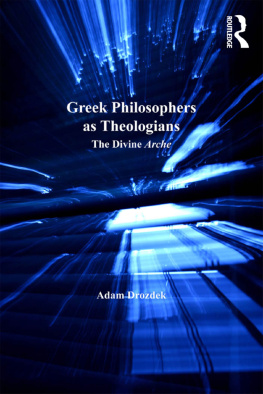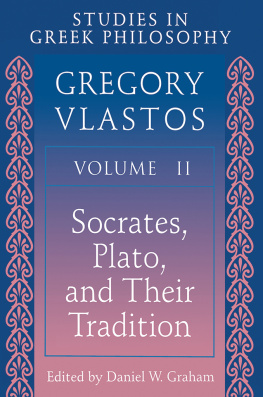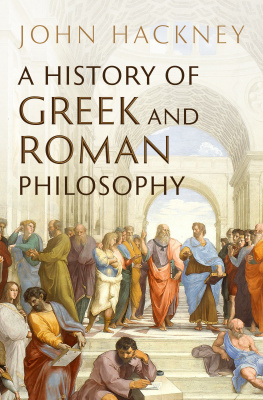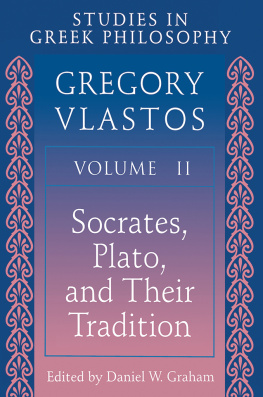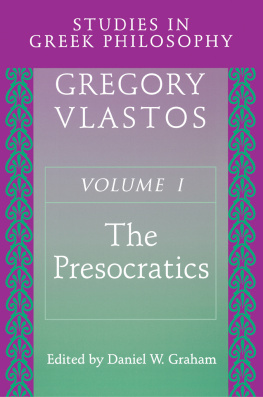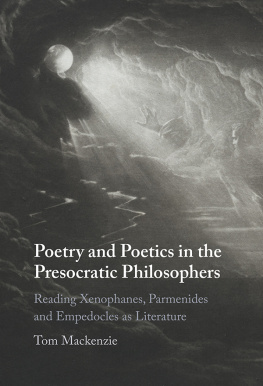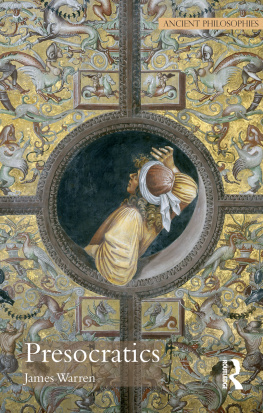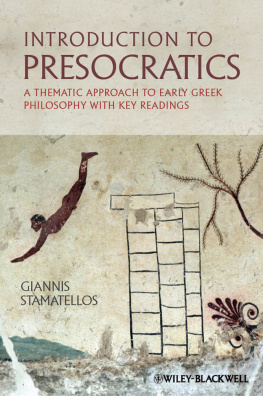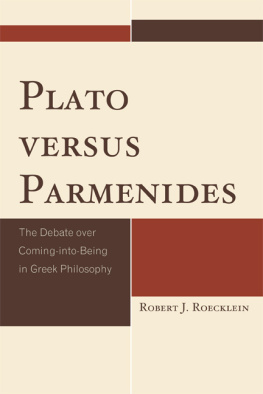GREEK PHILOSOPHERS AS THEOLOGIANS
Concepts of God presented by Greek philosophers were significantly different from the image of the divine of popular religion and indicate a fairly sophisticated theological reflection from the very inception of Greek philosophy. This book presents a comprehensive history of theological thought of Greek philosophers from the Presocratics to the early Hellenistic period. Concentrating on views concerning the attributes of God and their impact on eschatological and ethical thought, Drozdek explains that theology was of paramount importance for all Greek philosophers even in the absence of purely theological or religious language.
To my wife, Bogna
Greek Philosophers as Theologians
The Divine Arche
ADAM DROZDEK
Duquesne University, USA

First published 2007 by Ashgate Publishing
Published 2016 by Routledge
2 Park Square, Milton Park, Abingdon, Oxon OX14 4RN
711 Third Avenue, New York, NY 10017, USA
Routledge is an imprint of the Taylor & Francis Group, an informa business
Copyright 2007 Adam Drozdek
Adam Drozdek has asserted his moral right under the Copyright, Designs and Patents Act, 1988, to be identified as the author of this work.
All rights reserved. No part of this book may be reprinted or reproduced or utilised in any form or by any electronic, mechanical, or other means, now known or hereafter invented, including photocopying and recording, or in any information storage or retrieval system, without permission in writing from the publishers.
Notice:
Product or corporate names may be trademarks or registered trademarks, and are used only for identification and explanation without intent to infringe.
British Library Cataloguing in Publication Data
Drozdek, Adam
Greek philosophers as theologians : the divine arche
1. Cosmology, Ancient 2. Philosophy, Ancient
I. Title
113.0938
Library of Congress Cataloging-in-Publication Data
Drozdek, Adam.
Greek philosophers as theologians : the divine arche / Adam Drozdek.
p. cm.
Includes bibliographical references and index.
ISBN 978-0-7546-6189-4 (hardcover : alk. paper) 1. Philosophy, Ancient.
2. GodHistory of doctrines. 3. Philosophical theologyHistory.
4. God (Greek religion) I. Title.
B187.T5D76 2007
210.938dc22
2007002458
ISBN 978-0-7546-6189-4 (hbk)
ISBN 978-1-3155-8588-8 (ebk)
Contents
Preface
The subject of this book is a history of theological thought of Greek philosophers from the Presocratics to the early Hellenistic period. Concepts of God presented by Greek philosophers were significantly different from the image of the divine of popular religion and indicate a fairly sophisticated theological reflection from the very inception of Greek philosophy. The book concentrates on views of the philosophers concerning the attributes of God and the impact of their theological position on views concerning eschatology, ethics, and social thinking (if views concerning these areas can be recovered from the extant sources).
The view espoused here is that theology was of paramount importance for all Greek philosophers even if theological or religious language is not used (for example, Anaxagoras), or if theological reasoning is of apparently secondary importance (for example, Democritus), or if religious concepts are rationalized (for example, the Sophists). More specifically, the emergence of Greek philosophy coincides with theological elaboration of the concept of the divine. The philosophical interest in establishing the cosmic arche that is, both the principle and the beginning of the world is rooted in the interest of what constitutes divinity of the gods, which together give rise to a very strong monotheistic bias of theological views of the most of the Greek philosophers. This is clear from the very beginning of Greek philosophical reflection, when the Milesians ontology is based on monotheistic coloring of their views which consider one cosmic principle, and when the Pythagoreans focus on the principle of the harmonious makeup of the world. This monotheistic tendency is continued by Xenophanes strong profession of the existence of one God; with Parmenides, whose Being clearly possesses divine attributes. It can also be seen later in Anaxagoras, whose Nous was a divine being, all alone, holy and ineffable; in Empedocles, Diogenes of Apollonia, Socrates, Antisthenes, and in Plato, whose Demiurge was a creator of the world; and in the divine Unmoved Mover of Aristotle. The tendency is also very strong in successors of Plato and Aristotle, and it is pronounced in the Stoics as sublimely expressed in Cleanthes hymn.
Theological views of Greek philosophers usually differed from views commonly accepted to the extent that some of them were convicted of impiety, and as the fate of Socrates indicates, such a conviction could not be treated lightly. However, in many respects, theological views of philosophers offer the view of the divine which is grander than the popular views.
This book attempts to present the process of development of the concept of God. Although, as stated, the beginning of Greek philosophy is marked by the emergence of monotheism, the problem of how this monotheistic vision applies in life was probably of lesser concern to the Milesians than the theological purification of the concept of the divine. Also, physics reflects a particular version of monotheism espoused by the Milesians and becomes a supporting argument of the validity of this monotheism. But monotheism will stay in Greek philosophy, and with it, a more personal side will be developed: the problem of immortality, the problem of theodicy, the problem of providence, the problem of the structure of society. These problems will be presented in the course of the discussion of the views of particular philosophers.
Acknowledgments
I would like to thank the editors of Studi Italiani di Filologia Classica for their permission to include Xenophanes theology as .
Chapter 1
The Milesians
It is not very often that the Ionian thinkers are considered to be theologians. An exception might be made for Xenophanes and Heraclitus, but the first three Ionians, the Milesians, are perceived as philosophers who were primarily interested in cosmogony, cosmology, physics, and biology rather than in theology. Nevertheless, the meaning of the ideas put forth by the Milesians is drastically impoverished if the religious aspect is not taken into account or is treated as a negligible element. Their theology should, however, be set against the background of religious views of the epic poets.
Epic gods
Homer and Hesiod provided the Greeks with the account of the origins of the gods and gave the gods their names and defined their honors and skills and indicated their shapes (Herodotus 2.53), but Homer transmitted religious tradition as much as he created it. Not always is it possible to separate the old from the new. It is assumed here that the tremendous importance of Homer for the Greeks is due in no small measure to his theology.
The most pronounced attribute of Greek gods is their immortality. The gods are immortal (, Il. 19.2, Th. 21, 105), they live forever ( , Il. 1.290, Th. 33, , Il. 6.527). There were times when gods did not exist. There were times when inanimate matter had the potential to generate them through an inscrutable mechanism of theogony. Other attributes included in divinity of immortal gods is their intelligence and, consequently, being alive; next, their superhuman knowledge, superhuman powers, and an ability to appear in any form.
Next page
